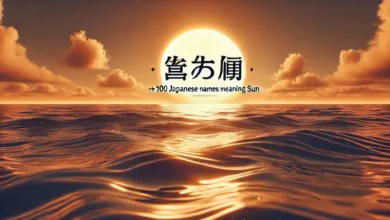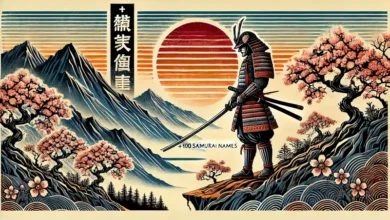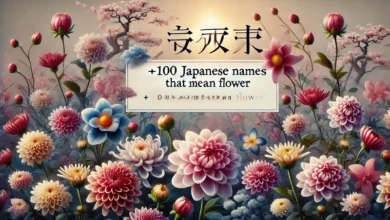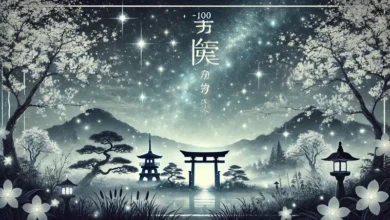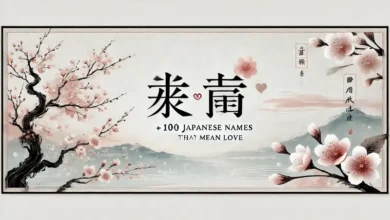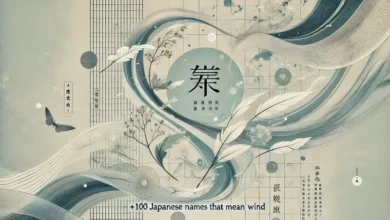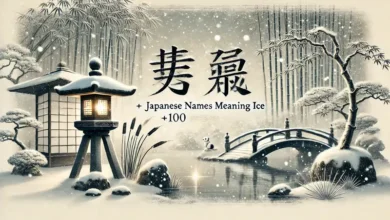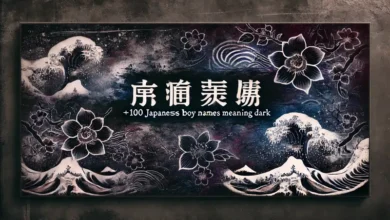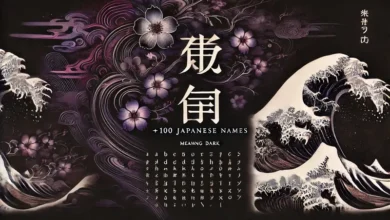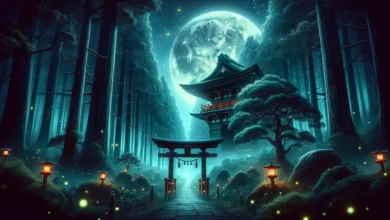Japanese Names
+100 Japanese Names Meaning Water – Unique & Beautiful
For copy name or description, please click on that!
| Name | Description |
|---|---|
Tamaura (玉浦) | "Jewel bay," suggesting preciousness of water. |
Natsuki (夏希) | "Summer hope," representing warmth and the joy of water activities. |
Mizunoha (水の葉) | "Water leaf," symbolizing life. |
Mizuhana (水花) | "Water flower," a poetic way to refer to water lilies. |
Kazuki (和樹) | "Harmonious tree," representing growth nourished by water. |
Have you ever wondered about the beautiful and symbolic names that Japanese parents choose for their children? Today, we’re going to delve into a fascinating topic: Japanese names inspired by the element of water.
Water plays a crucial role in Japanese culture, representing life, purity, and serenity. It’s no surprise that many Japanese names reflect this deep connection. Let’s embark on a journey through the world of water-inspired names, discovering their unique meanings and cultural significance.
Japanese Girl Names That Mean Water
- Mizuki (水希) – “Water hope,” symbolizing the refreshing essence of water and the hope it brings.
- Sui (水) – Simply means “water,” representing purity and fluidity.
- Aqua (アクア) – Derived from Latin, often used in Japan to represent water, evoking clarity and calmness.
- Mizuno (水野) – “Field of water,” representing a connection to nature and serenity.
- Harumi (春美) – “Spring beauty,” often associated with the gentle waters of spring.
- Kiyomi (清美) – “Clear beauty,” reflecting the clarity and purity of clean water.
- Misaki (水咲) – “Water blossom,” symbolizing beauty and life.
- Sakura (桜) – “Cherry blossom,” associated with spring waters and renewal.
- Hikari (光) – “Light,” often related to sunlight reflecting off water, creating beauty.
- Aoi (青い) – “Blue,” evoking the colors of water.
- Mizuki (瑞希) – “Auspicious water,” symbolizing good fortune and blessings.
- Suiyou (水陽) – “Water sun,” representing the harmonious balance of water and light.
- Nami (波) – “Wave,” reflecting the movement and rhythm of water.
- Ami (亜美) – “Asian beauty,” often connected to the beauty of water bodies in Asia.
- Sei (清) – “Pure,” signifying the purity of water.
- Ayame (菖蒲) – “Iris,” a flower often found near water, representing grace.
- Fumiko (文子) – “Child of the writing,” but can also symbolize the flow of thoughts like water.
- Yuriko (百合子) – “Lily child,” with lilies often growing near water.
- Natsumi (夏美) – “Summer beauty,” evoking images of refreshing summer waters.
- Mizuho (瑞穂) – “Abundant rice,” with rice needing water to grow, representing sustenance.
- Suiha (水羽) – “Water feather,” symbolizing lightness and grace.
- Akira (明) – “Bright,” reflecting sunlight on water.
- Hana (花) – “Flower,” often found blooming near water bodies.
- Mizu (水) – Directly means “water,” simple and clear.
- Mizuki (瑞樹) – “Auspicious tree,” suggesting a life nourished by water.
- Tsubaki (椿) – “Camellia,” often found near streams, symbolizing elegance.
- Rika (理香) – “Logic and fragrance,” reflecting the clarity of water and its refreshing aroma.
- Ruri (瑠璃) – “Lapis lazuli,” a deep blue stone reminiscent of deep waters.
- Kaori (香り) – “Fragrance,” often associated with the scents found near water.
- Kana (香菜) – “Fragrant greens,” representing the lushness of areas near water.
- Yuuna (優菜) – “Gentle greens,” symbolizing the soothing nature of water.
- Rin (凛) – “Dignified,” reflecting the calm and serene nature of water.
- Shiori (詩織) – “Poem weave,” representing the flow of poetry akin to the flow of water.
- Sana (咲奈) – “Blossoming,” reminiscent of flowers that bloom near water.
- Hanae (花江) – “Flower river,” combining the beauty of flowers and the essence of water.
- Yuki (雪) – “Snow,” representing water in its frozen form.
- Natsuki (夏希) – “Summer hope,” connected to the refreshing waters of summer.
- Minami (南) – “South,” often associated with warm, tropical waters.
- Kiyoko (清子) – “Pure child,” representing innocence and clarity like fresh water.
- Ame (雨) – “Rain,” symbolizing water in its most nurturing form.
- Miyuki (美幸) – “Beautiful happiness,” suggesting the joy water brings.
- Hinata (日向) – “Sunny place,” often depicting sunny waters.
- Mikako (美香子) – “Beautiful fragrance child,” connecting beauty and nature.
- Yoshiko (良子) – “Good child,” representing purity like clear water.
- Sayaka (清香) – “Clear fragrance,” symbolizing the refreshing scent of nature near water.
- Tama (珠) – “Jewel,” often used to represent the sparkling quality of water.
- Suiha (水葉) – “Water leaf,” symbolizing life nourished by water.
- Rika (理香) – “Logic and fragrance,” symbolizing clarity of thought and beauty.
- Chizuru (千鶴) – “Thousand cranes,” often connected with water and grace.
- Kumi (久美) – “Long beauty,” representing the everlasting nature of water.
Japanese Boy Names That Mean Water
- Mizuto (水斗) – “Water fight,” symbolizing the strength and playfulness of water.
- Haruki (春樹) – “Spring tree,” representing growth nurtured by water.
- Kaito (海斗) – “Ocean big,” symbolizing vastness and depth.
- Riku (陸) – “Land,” often juxtaposed with the idea of water.
- Natsuki (夏希) – “Summer hope,” representing warmth and the joy of water activities.
- Suiichi (水一) – “First water,” signifying purity and the essence of life.
- Kaoru (薫) – “Fragrance,” often associated with the scents found near water.
- Shinji (真治) – “True healing,” reflecting the restorative properties of water.
- Kiyoshi (清志) – “Pure aspiration,” symbolizing the clarity of intention like clear water.
- Ren (恋) – “Love,” representing the nurturing aspect of water.
- Atsushi (篤志) – “Warm intent,” reflecting the warmth of water.
- Takumi (匠海) – “Craftsman of the sea,” symbolizing skill and creativity associated with water.
- Haruto (陽翔) – “Sunshine flying,” representing sunlight on water.
- Kazuki (和希) – “Harmonious hope,” symbolizing the balance of water and life.
- Daiki (大輝) – “Great radiance,” reflecting the brightness of sunlight on water.
- Souta (颯太) – “Sound of the wind,” often felt by water bodies.
- Ryo (涼) – “Refreshing,” like a cool breeze over water.
- Yuki (雪) – “Snow,” representing the purity of melted water.
- Masaki (正明) – “Right light,” symbolizing clarity and guidance like water.
- Kousuke (航介) – “Navigation help,” symbolizing water travel.
- Rikuya (陸也) – “Land exists,” often used to contrast with water.
- Mitsu (光) – “Light,” symbolizing the reflection of light on water.
- Rei (礼) – “Gratitude,” representing appreciation for life-sustaining water.
- Taro (太郎) – “Big son,” symbolizing strength and nourishment from water.
- Shou (翔) – “Fly,” often symbolizing freedom over water.
- Kouhei (浩平) – “Wide and flat,” often used to describe calm waters.
- Takeshi (武) – “Warrior,” symbolizing the strength of water.
- Kenshin (賢心) – “Wise heart,” reflecting the wisdom of nature’s waters.
- Noboru (昇) – “Rise,” symbolizing the rise of water levels.
- Yoshiki (良樹) – “Good tree,” symbolizing growth supported by water.
- Ryu (竜) – “Dragon,” often associated with water in Japanese mythology.
- Asahi (朝日) – “Morning sun,” representing dawn reflecting on water.
- Takahiro (隆弘) – “Noble vastness,” symbolizing expansive water bodies.
- Akira (明) – “Bright,” reflecting the light and clarity of water.
- Mizuki (水樹) – “Water tree,” symbolizing life supported by water.
- Yuuto (優斗) – “Gentle big,” representing the nurturing aspect of water.
- Masato (正人) – “Correct person,” symbolizing the purity of intention.
- Haru (陽) – “Sun,” representing warmth and life provided by water.
- Ryouma (竜馬) – “Dragon horse,” symbolizing the strength of water.
- Ichirou (一郎) – “First son,” often representing beginnings like the first rain.
- Satoshi (聡志) – “Wise aspiration,” reflecting clarity like water.
- Kazuki (和樹) – “Harmonious tree,” representing growth nourished by water.
- Yuji (勇二) – “Brave second,” symbolizing strength derived from water.
- Seiji (清治) – “Pure governance,” representing clarity in leadership.
- Masashi (正志) – “Correct aspiration,” signifying purity of goals.
- Ryota (涼太) – “Cool big,” reflecting the refreshing nature of water.
- Shouhei (翔平) – “Fly flat,” symbolizing calm waters.
- Kazuya (和也) – “Harmony exists,” representing balance in life.
- Haruto (陽斗) – “Sunshine big,” reflecting brightness over water.
- Fumihiro (文宏) – “Literary vastness,” symbolizing deep thoughts like deep waters.
Unisex Japanese Names That Mean Water
- Mizuki (水月) – “Water moon,” symbolizing tranquility and reflection.
- Aoi (青い) – “Blue,” often associated with the color of water.
- Sui (水) – Simply means “water,” representing purity and fluidity.
- Nami (波) – “Wave,” reflecting the movement and rhythm of water.
- Kaito (海斗) – “Ocean flying,” representing freedom over water.
- Mizuho (瑞穂) – “Abundant water rice,” symbolizing prosperity and nourishment.
- Haruka (遥香) – “Distant fragrance,” evoking the essence of water in nature.
- Sei (清) – “Pure,” signifying the clarity and purity of water.
- Yururi (優流) – “Gentle flow,” reflecting the soothing nature of water.
- Tsubasa (翼) – “Wings,” symbolizing freedom and movement over water.
- Kiyoshi (清) – “Clear, pure,” representing the purity of water.
- Riku (陸) – “Land,” but often used in a context contrasting with water.
- Aqua (アクア) – Derived from Latin, representing the essence of water.
- Suiyou (水陽) – “Water sun,” symbolizing harmony between water and light.
- Rei (玲) – “Sound of jewels,” evoking the sound of water.
- Harumi (春美) – “Spring beauty,” often linked to the renewal of water.
- Kaminari (雷) – “Thunder,” sometimes associated with storms and water.
- Rin (凛) – “Dignified,” can evoke the clarity of water.
- Hikari (光) – “Light,” representing sunlight reflecting on water.
- Akira (明) – “Bright,” often associated with clarity and freshness like water.
- Mizuryū (水竜) – Directly translates to “water dragon,” symbolizing power and fluidity.
- Aoi Ryū (青い竜) – “Blue dragon,” often associated with water and the sky.
- Kairyū (海竜) – “Ocean dragon,” representing strength and majesty in the sea.
- Suiryū (水龍) – “Water dragon,” combining “sui” for water and “ryū” for dragon.
- Ryūsen (龍泉) – “Dragon spring,” symbolizing the source of water and life.
- Tatsumaki (竜巻) – “Dragon tornado,” evoking the power of water in storms.
- Amanogawa (天の川) – “River of heaven,” often associated with mythical water dragons.
- Minato Ryū (港竜) – “Harbor dragon,” representing the connection between water and land.
- Suijin (水神) – “Water god,” often depicted as a dragon in mythology.
- Ryūka (龍火) – “Dragon fire,” signifying a dragon’s dual nature associated with water and fire.
Japanese Last Names That Mean Water
- Mizuno (水野) – “Field of water,” symbolizing a landscape rich in water.
- Suiran (水蘭) – “Water orchid,” representing beauty found near water.
- Mizushima (水島) – “Water island,” suggesting a place surrounded by water.
- Kawasaki (川崎) – “River cape,” indicating land near a river.
- Mizukami (水上) – “Above water,” often associated with high ground near water.
- Kawamoto (川本) – “Source of the river,” signifying the beginning of a waterway.
- Uezumi (上澤) – “Upper marsh,” referring to wetlands near water.
- Suiseki (水石) – “Water stone,” often used in gardens, symbolizing tranquility.
- Nagakubo (長久保) – “Long marsh,” indicating a vast area of water.
- Hirakawa (平川) – “Flat river,” representing calm and gentle waters.
- Mizuki (水木) – “Water tree,” symbolizing growth nourished by water.
- Amagawa (天川) – “Heavenly river,” often evoking images of divine waters.
- Shiratori (白鳥) – “White bird,” often associated with water bodies.
- Kawaguchi (川口) – “River mouth,” where a river meets the sea.
- Inoue (井上) – “Above the well,” referring to a source of water.
- Fujikawa (藤川) – “Wisteria river,” connecting flowers and water.
- Shimizu (清水) – “Clear water,” symbolizing purity.
- Yamazaki (山崎) – “Mountain cape,” indicating land near a water source.
- Hoshikawa (星川) – “Star river,” evoking a magical water body.
- Tachibana (橘) – “Citrus tree,” often found near water.
- Tsubaki (椿) – “Camellia,” a flower thriving near water.
- Kawashima (川島) – “River island,” indicating land surrounded by water.
- Suiren (睡蓮) – “Water lily,” symbolizing beauty in aquatic environments.
- Mizutani (水谷) – “Water valley,” representing a fertile area.
- Tamaura (玉浦) – “Jewel bay,” suggesting preciousness of water.
- Suikyo (水京) – “Water capital,” representing a city by the water.
- Kairi (海里) – “Sea distance,” evoking vastness.
- Mizunoha (水の葉) – “Water leaf,” symbolizing life.
- Tateishi (立石) – “Standing stone,” often found in water settings.
- Tachiyama (立山) – “Standing mountain,” indicating height near water.
- Miyama (深山) – “Deep mountain,” often referring to water sources.
- Higashikawa (東川) – “East river,” indicating a river’s direction.
- Tsuruga (敦賀) – “Peaceful bay,” evoking tranquility.
- Ohashi (大橋) – “Big bridge,” symbolizing connection over water.
- Suiryu (水流) – “Water flow,” representing the movement of water.
- Kamiyama (上山) – “Upper mountain,” suggesting high ground near water.
- Nishikawa (西川) – “West river,” indicating a river’s direction.
- Mizusawa (水沢) – “Water marsh,” representing wetland areas.
- Seiran (清嵐) – “Clear storm,” symbolizing powerful yet pure waters.
- Amanokawa (天の川) – “River of heaven,” often associated with the Milky Way.
- Kawashiro (川城) – “River castle,” suggesting protection near water.
- Suiran (水蘭) – “Water orchid,” representing beauty and elegance.
- Nagata (永田) – “Eternal rice paddy,” symbolizing sustenance through water.
- Yoshikawa (良川) – “Good river,” indicating a fertile area.
- Suisen (水仙) – “Daffodil,” often found near water.
- Mizukawa (水川) – “Water river,” emphasizing the essence of water.
- Kazekawa (風川) – “Wind river,” suggesting movement and fluidity.
- Kaminokawa (上の川) – “Upper river,” indicating a source of fresh water.
- Aoi (青井) – “Blue well,” symbolizing depth and clarity.
- Mizukuri (水国) – “Water country,” representing a region rich in water resources.
- Hasu (蓮) – The direct term for “lotus” or “water lily.”
- Ren (蓮) – A popular name derived from the kanji for water lily, symbolizing beauty and purity.
- Kaho (香帆) – “Fragrance of the sail,” often associated with the elegance of water lilies.
- Mizuhana (水花) – “Water flower,” a poetic way to refer to water lilies.
- Suiren (睡蓮) – Specifically means “water lily,” emphasizing its serene beauty.
- Yurina (百合奈) – “Lily and N,” where “lily” often connects to water flowers.
- Hana (花) – While it means “flower,” it can evoke the imagery of water lilies in context.
